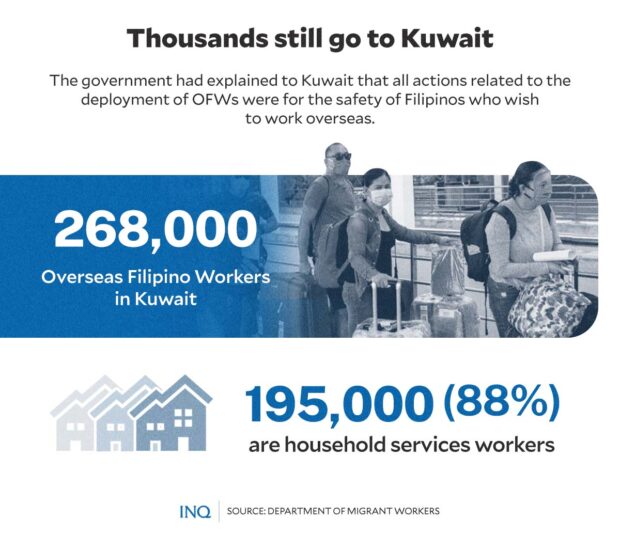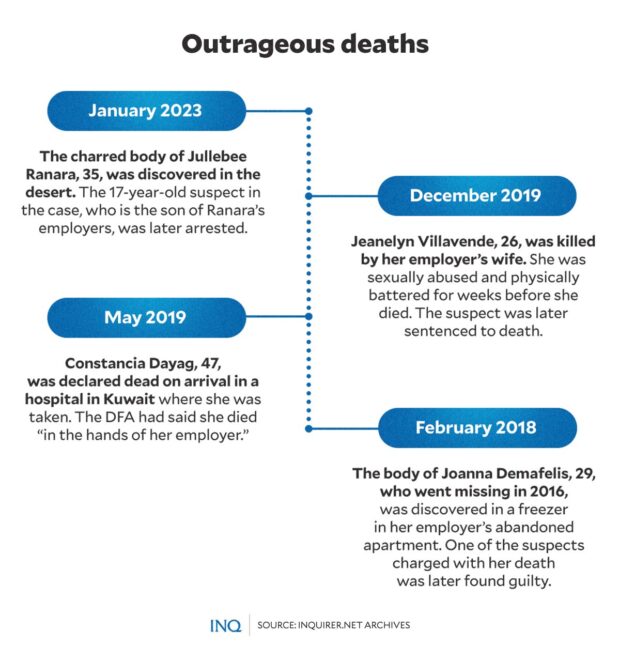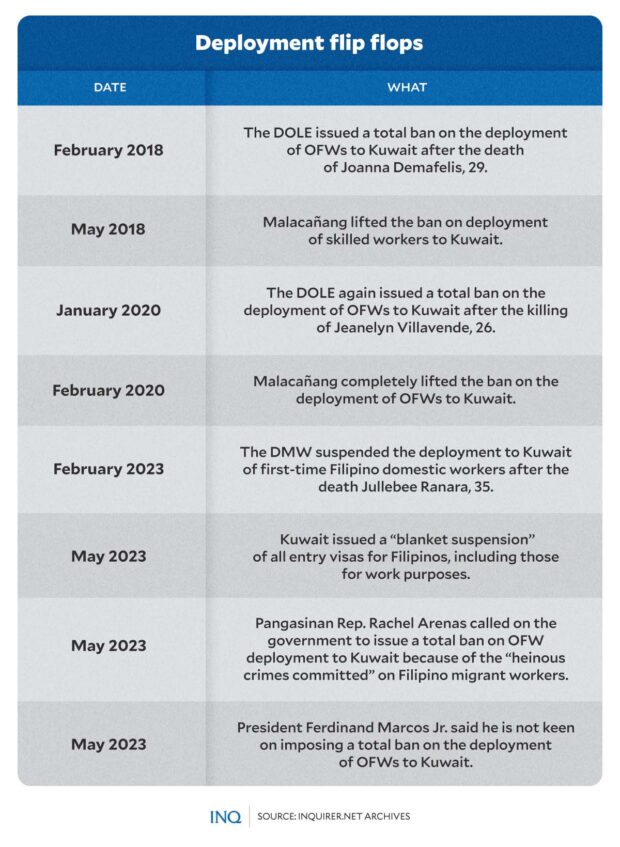Kuwait, where OFW abuse is routine, targets Filipino visas as PH gov’t flip flops on deployment ban

MANILA, Philippines—“One death is too many,” the Commission on Human Rights (CHR) said when Jullebee Ranara, a 35-year-old overseas Filipino worker (OFW), was killed in Kuwait this year.
The CHR, which decried the killing of Ranara, had stated that there is an increasing number of distressed OFWs seeking help in shelters and are waiting for repatriation in the oil-rich country.
According to the Human Rights Watch, several embassies in Kuwait, including the Philippines, received over 10,000 complaints from domestic workers in 2009 regarding these:
- Physical, sexual and psychological abuse
- Nonpayment of wages
- Excessively long working hours without rest
“Many more abuses likely remain unreported,” it said, pointing out that domestic workers have few avenues for redress—the reason that as years passed, abuses persisted, and thousands of OFWs have been victims.
Kabayan Rep. Ron Salo had stated this year that, there have been 6,000 complaints from OFWs in 2017 regarding physical abuse, sexual harassment, and even rape in Kuwait.
Then based on data from the Overseas Workers Welfare Administration, which Sen. Raffy Tulfo cited when he filed Senate Resolution No. 448, 196 OFWs have died in Kuwait since 2016, with almost 80 percent caused by physical abuse.
As Tulfo pointed out, he filed the resolution to investigate, in aid of legislation, the existing bilateral agreement and standard employment contract governing OFWs in Kuwait.
According to him, this has the end view of establishing stricter policies, preventive measures and applicable sanctions or ban on the deployment of OFWs in Kuwait, especially amid the string of killings of OFWs by their employers.
Tragic
The United Nations Children’s Fund said some people choose to work overseas because there are limited opportunities in their home countries– or available jobs do not pay enough to sustain a family.
Unicef said that even if it was really hard, there are Filipinos who decide to work overseas because “higher-paying jobs elsewhere may allow them to improve their family’s living conditions.”
Based on data from the Philippine Statistics Authority (PSA), there were 1.83 million OFWs in 2021, which consisted of 96.4 percent with existing work contracts and 3.6 percent without working visa or work permits.
Out of the 1.83 million, 5.9 percent were in Kuwait, making the Arab state one of the top deployment destinations for OFWs, next to Hong Kong (6.7 percent) and the United Arab Emirates (14.4 percent).
Out of the 1.83 million, 5.9 percent were in Kuwait, making the Arab state one of the top deployment destinations for OFWs, next to Hong Kong (6.7 percent) and the United Arab Emirates (14.4 percent).

GRAPHIC Ed Lustan
The Department of Migrant Workers (DMW), however, has more recent data, saying that there are about 268,000 OFWs in Kuwait, and of these, 195,000, or 88 percent, are household services workers.
But for some OFWs, Kuwait has been a “hostile workplace,” as stressed in an editorial by the INQUIRER on Jan. 31, 2023, with almost 200 Filipinos who never made it back to the Philippines and be with their families alive.
Some of them are Ranara, Jeanelyn Villavende, Constancia Dayag, and Joanna Demafelis.

GRAPHIC Ed Lustan
- Joanna Demafelis
Demafelis, 29, a domestic worker, went missing in 2016. Her lifeless body, which bore torture signs, was discovered in a freezer inside her employer’s abandoned apartment in February 2018.
The following year, one of her employers, Syrian Mouna Ali Hassoun was found guilty of killing Demafelis. Hassoun’s husband, Lebanese Nader Essam Assaf, has been charged with murder, too.
- Constancia Dayag
Dayag, 47, was declared dead on arrival in May 2019 at a hospital in Kuwait where she was taken after being beaten and sexually assaulted, as her body bore “contusions and hematoma.”
The Department of Foreign Affairs stated then that Dayag died “in the hands of her employer,” who was identified as Bader Ibrahim Mohammad Hussain. The suspect was later charged with murder.
- Jeanelyn Villavende
Villavende, 26, died in December 2019 because of “acute failure of heart and respiration as a result by (sic) shock and multiple injuries in the vascular nervous system.” It was stated that she was sexually abused and physically battered for weeks before she died.
Her employer was later sentenced to death by hanging. with the court finding that Villavende’s employer assaulted her for days and imprisoned her in a room until her death. The employer’s husband, meanwhile, was sentenced to four years in prison.
- Jullebee Ranara
Ranara, 35, was found in the desert in January 2023—lifeless. The 17-year-old suspect in the case, who is the son of her employers, was later arrested by the police in Kuwait.
Information from the case said that Ranara was raped and impregnated by the suspect, beaten to death, ran over twice by the killer’s car, burned, and finally her body dumped in the desert.
Escalating tension
Because of the deaths, the Philippines had already issued bans—total or partial—on the deployment of OFWs to Kuwait, with the government stressing that all actions by the government are for the safety of Filipinos.

GRAPHIC Ed Lustan
- February 2018
After the death of Demafelis, the Department of Labor and Employment (DOLE) issued a total ban on the deployment of OFWs to the Arab state through Administrative Order No. 54. It took effect immediately.
- May 2018
Two months later, however, then President Rodrigo Duterte ordered the lifting of the total ban amid the signing of an agreement between the Philippines and Kuwait that seeks to provide legal protection to and improve the working conditions of OFWs.
- January 2020
The DOLE issued a total deployment ban, covering all “newly-hired domestic workers or household service workers, semi-skilled workers, skilled workers and professionals, including crew changes and shore leaves of Filipino seafarers.”
- February 2020
The government lifted the remaining deployment ban “after due consultation with the DFA and with the filing of appropriate charges against the perpetrators (in the killing) of OFW Jeanelyn Villavende.”
- February 2023
After the death of Ranara, the DMW decided to suspend the deployment to Kuwait of first-time Filipino domestic workers while the government is working with the Arab state to strengthen the safeguards for them.
This move, the DMW said, was expected to affect up to 47,000 aspiring OFWs.
According to Migrant Workers Secretary Susan Ople, the application of first-time Filipino domestic workers shall be deferred until significant reforms have been made resulting from the upcoming bilateral talks with Kuwait.
Officials of the two countries already met from May 16 to 17 after Kuwait’s Ministry of Interior implemented a “blanket suspension’’ on the issuance of all types of entry visas for Filipinos, including those for work purposes.
The visa suspension, however, was described by Foreign Affairs Undersecretary Eduardo de Vega as a response to the decision of the Philippines in February to suspend the deployment to Kuwait of first-time Filipino domestic workers.
But as stressed by Pangasinan Rep. Rachel Arenas, the government should even issue a total ban on OFW deployment to Kuwait because of the “heinous crimes committed” on Filipino migrant workers, a move that President Ferdinand Marcos Jr. is not keen to heed.
The DMW, in the meantime, assured the affected OFWs that all of them will get help in finding jobs in the Philippines or in another country.
While Kuwait did not officially disclose the reason behind its decision, De Vega said it stemmed from the Philippines’ alleged non-compliance with a 2018 labor agreement between the two countries.
These alleged violations included the initiative to set up a shelter for runaway Filipino household workers and the effort to reach out to Kuwaiti employers over reports of abuses.
De Vega, however, remained hopeful that this could still be “discussed and resolved diplomatically.”



